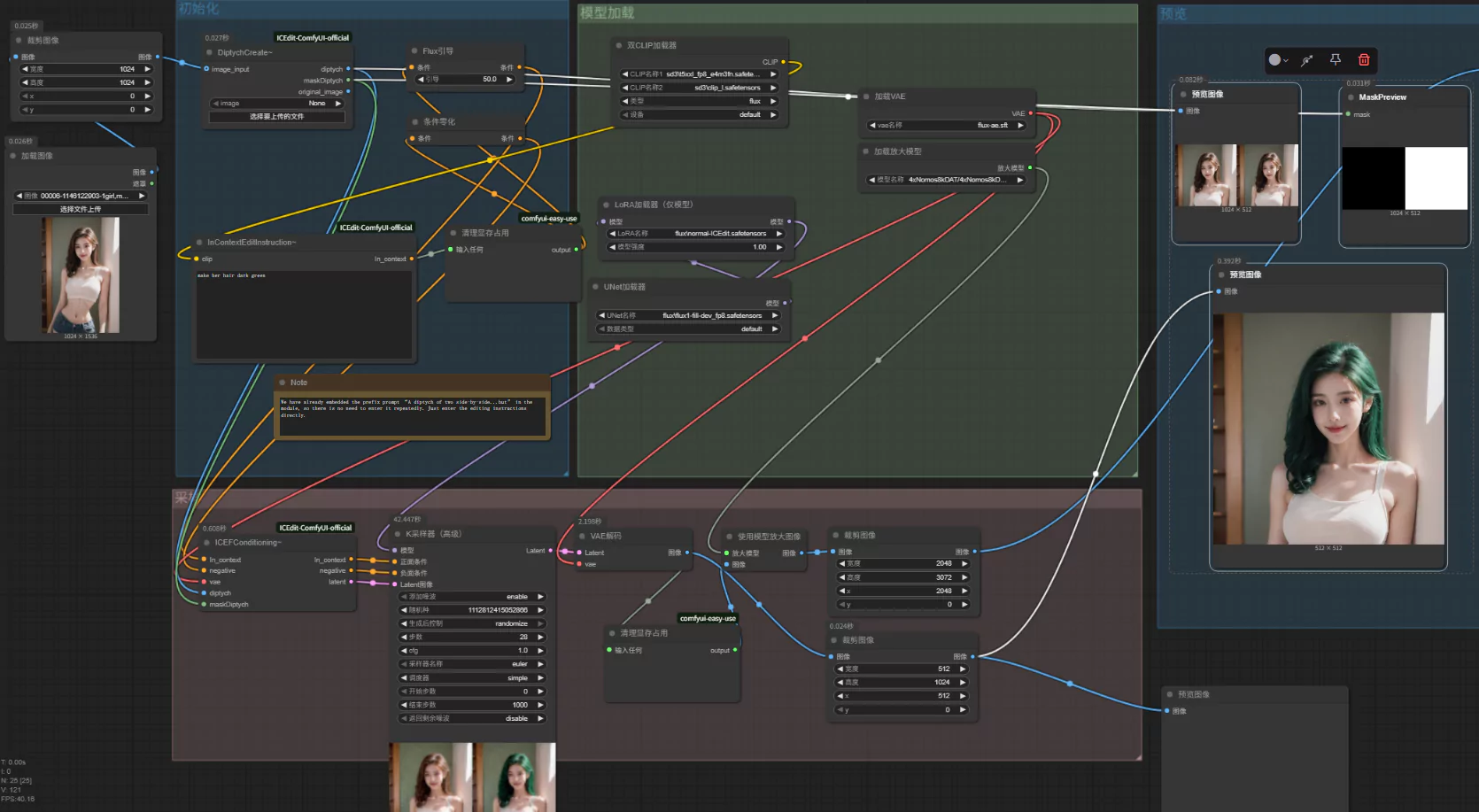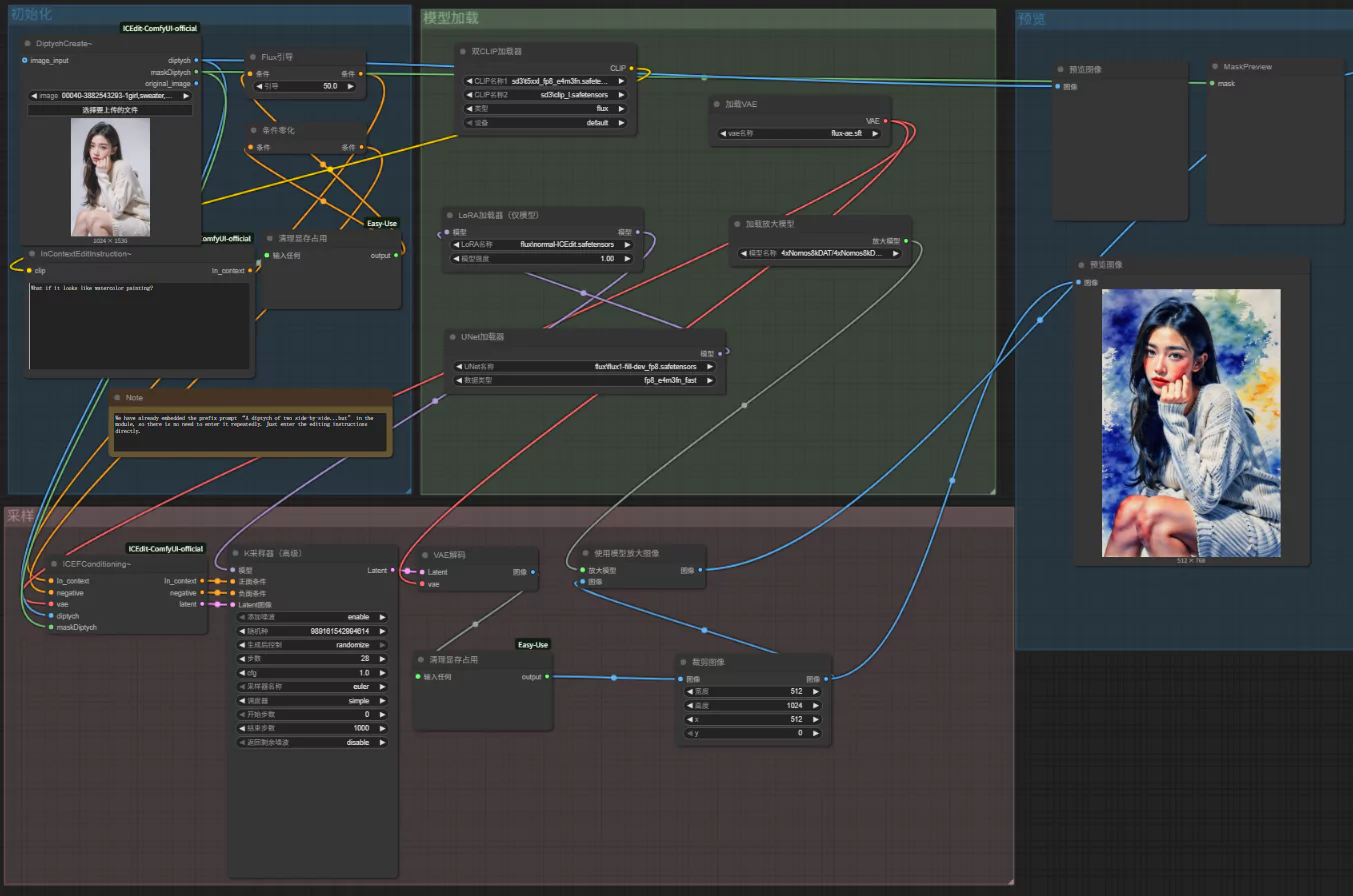ICEdit ComfyUI: The Complete Guide to AI Image Editing Workflows
Master ICEdit's ComfyUI integration for professional AI-powered image editing and generation workflows
Introduction to ICEdit ComfyUI
ICEdit ComfyUI represents a powerful integration that brings professional-grade AI image editing capabilities directly into the ComfyUI ecosystem. This comprehensive workflow system allows creators, artists, and developers to build sophisticated image processing pipelines with intuitive node-based interfaces.

The official ICEdit ComfyUI workflow provides a robust foundation for creating complex image editing operations, from basic adjustments to advanced AI-powered transformations. Built on the proven Flux.1-fill-dev model and enhanced with ICEdit-normal-LoRA, this system delivers exceptional results for both beginners and professionals.
Key Benefits
- Node-based visual workflow design
- Integration with existing ComfyUI setups
- Support for complex image processing chains
- Community-driven workflow sharing
- Professional-grade AI model integration
Understanding ComfyUI and ICEdit Integration
ComfyUI stands as one of the most flexible and powerful interfaces for AI image generation and processing. Its node-based approach allows users to create complex workflows by connecting different processing steps visually, making it accessible to both technical and non-technical users.
Core Components
DiptyCreate Node
The central component for image input and processing initialization. This node handles:
- Direct image loading
- Input from other ComfyUI nodes
- Error prevention mechanisms
- Workflow state management
ICEF Workflow
The main processing pipeline that enables:
- Multi-stage image processing
- AI model integration
- Custom parameter adjustment
- Output optimization
Important Note
When using processed images from other ComfyUI nodes, the DiptyCreate node will ignore its loaded image. However, you must still load an image in the DiptyCreate node to prevent workflow errors.
Installation Guide
ICEdit ComfyUI offers two installation methods to accommodate different user preferences and technical setups. Choose the method that best fits your workflow and technical comfort level.

Prerequisites
Required Dependencies
Before installing ICEdit ComfyUI, ensure you have these essential components:
- ComfyUI - The base platform
- ComfyUI_essentials - Core functionality extensions
- ComfyUI-Easy-Use - User interface enhancements
- Python 3.8+ - Programming environment
- Git - Version control system
Step 1: Install ComfyUI Base
Method 1: ComfyUI Manager (Recommended)
The ComfyUI Manager provides the most straightforward installation experience with automatic dependency resolution and easy management of custom nodes.
Install ComfyUI Manager
Launch ComfyUI
Install ICEdit via Manager
Open ComfyUI Manager → Select "Install via Git URL" → Enter:
Method 2: Manual Installation
For users who prefer direct control over their installation or need to customize the setup process.
Clone Repository
Start ComfyUI
Model Requirements and Setup
ICEdit ComfyUI requires specific AI models to function properly. The system is built around two primary models that work together to deliver exceptional image editing capabilities.
| Model | Purpose | Size | Download Method |
|---|---|---|---|
| Flux.1-fill-dev | Base image generation and processing | ~12GB | Auto-download via Hugging Face |
| ICEdit-normal-LoRA | Specialized editing enhancements | ~200MB | Auto-download via Hugging Face |
Download Options
✅ Automatic Download
If you have reliable internet access to Hugging Face:
- Models download automatically on first use
- No manual intervention required
- Always gets latest versions
- Simplest setup process
📥 Manual Download
If Hugging Face access is limited:
- Download models to local storage
- Configure paths in ComfyUI
- Works in restricted environments
- Requires additional setup steps
Getting Started: Your First Workflow
ICEdit ComfyUI comes with pre-built workflow examples that demonstrate the system's capabilities. These workflows serve as both learning tools and practical starting points for your own projects.
Loading Example Workflows
Step-by-Step Process
- Navigate to the
example_workflowdirectory - Locate the JSON workflow file you want to use
- Open ComfyUI in your web browser
- Drag and drop the JSON file directly onto the ComfyUI interface
- The workflow will automatically load with all nodes and connections
Workflow Components
Each example workflow includes several key components:
- Input Nodes: Handle image loading and parameter configuration
- Processing Nodes: Apply AI models and transformations
- Output Nodes: Save results and manage file formats
- Control Nodes: Manage workflow flow and conditions
Basic Workflow Operations
Input Setup
Configure image sources, adjust parameters, and set processing options
Processing
Execute AI models, apply transformations, and process image data
Output
Save processed images, preview results, and export in desired formats
Advanced Features and Customization
ICEdit ComfyUI offers extensive customization options for users who want to create specialized workflows or integrate with existing production pipelines.
Custom Node Configuration
Parameter Tuning
Fine-tune processing parameters for optimal results:
- Adjust strength and guidance values
- Modify sampling steps and methods
- Configure noise and seed parameters
- Set output resolution and quality
Workflow Chaining
Connect multiple processing stages for complex operations:
- Sequential image transformations
- Conditional processing branches
- Batch processing capabilities
- Error handling and fallbacks
Integration with Other Tools
ICEdit ComfyUI works well with other ComfyUI extensions and external tools:
| Integration Type | Compatible Tools | Use Cases |
|---|---|---|
| ComfyUI Extensions | ControlNet, AnimateDiff, IP-Adapter | Enhanced control, animation, style transfer |
| External APIs | REST endpoints, WebSocket connections | Automated processing, remote control |
| File Systems | Local storage, cloud services, databases | Batch processing, asset management |
Community Contributions and Sharing
The ICEdit ComfyUI project thrives on community contributions. Sharing workflows helps build a comprehensive library of solutions for common and specialized use cases.
How to Contribute Your Workflows
Prepare Your Workflow
Ensure your workflow is complete and well-documented:
- Save as JSON file in the workflow_example directory
- Test thoroughly with different inputs
- Include clear parameter descriptions
- Document any special requirements
Create Pull Request
Follow the standard GitHub contribution process:
- Fork the official repository
- Add your JSON file to workflow_example
- Include detailed description and instructions
- Submit pull request with clear title
Community Benefits
Contributing to the community provides mutual benefits:
- Help others solve similar problems
- Gain recognition for innovative solutions
- Receive feedback and improvements
- Build collaborative relationships
Troubleshooting Common Issues
Model Loading Errors
Symptoms: Workflow fails to start, model not found errors
Solutions:
- Verify internet connection to Hugging Face
- Check available disk space (models require 12+ GB)
- Manually download models if auto-download fails
- Restart ComfyUI after model installation
Memory Issues
Symptoms: Out of memory errors, system freezing
Solutions:
- Reduce batch size and image resolution
- Close other applications to free RAM
- Use CPU fallback for very large images
- Consider upgrading system memory
DiptyCreate Node Issues
Symptoms: Node errors, missing image inputs
Solutions:
- Always load an image even when using external inputs
- Check image format compatibility (PNG, JPG, WebP)
- Verify file paths and permissions
- Update to latest ICEdit ComfyUI version
Frequently Asked Questions
Recent Updates and News
Special thanks to [编程界的小学生] for creating a comprehensive tutorial for ICEdit-ComfyUI-official! This community-generated guide provides an excellent starting point for newcomers to the platform.
ICEdit ComfyUI nodes are now officially integrated into the Comfy Registry with support from comfy-org! This makes installation and discovery even easier for the broader ComfyUI community.
The official ICEdit ComfyUI workflow has been released! This marks a significant milestone in making advanced AI image editing accessible through the ComfyUI ecosystem.
Conclusion
ICEdit ComfyUI represents a significant advancement in accessible AI image editing technology. By combining the flexibility of ComfyUI's node-based interface with ICEdit's powerful processing capabilities, creators now have access to professional-grade tools that were previously available only through complex programming interfaces.
The system's strength lies not just in its technical capabilities, but in its growing community of contributors who continuously expand the library of available workflows. This collaborative approach ensures that ICEdit ComfyUI remains at the forefront of AI image editing innovation.
Ready to Get Started?
Begin your ICEdit ComfyUI journey today and discover the power of node-based AI image editing.